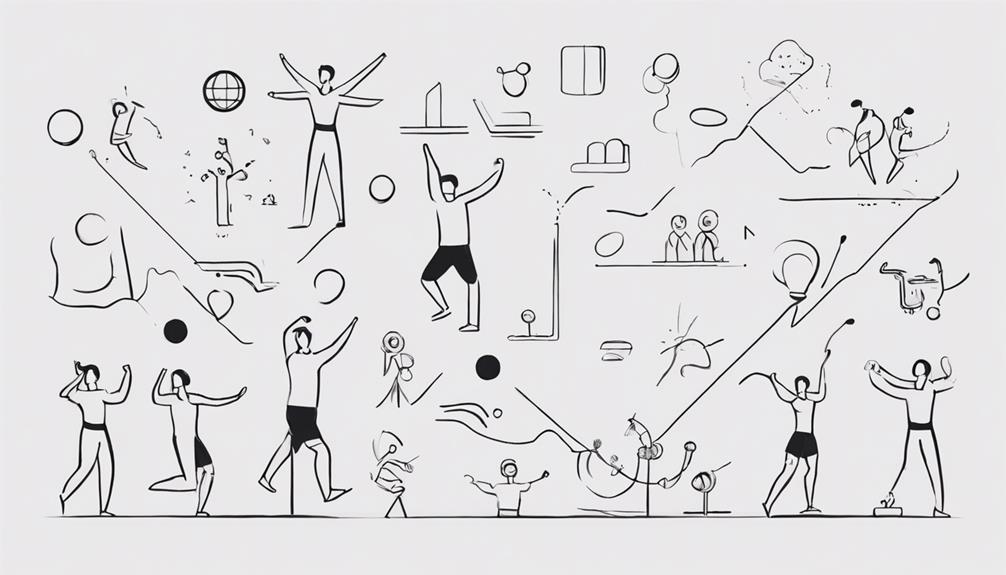Ready to set off on a journey of self-improvement through goal-setting? Define clear objectives to unleash your potential and become the best version of yourself. By setting personal development goals covering emotional, physical, social, and professional aspects, you create a roadmap for success and fulfillment. Embrace challenges, seek mentorship, and focus on skill development to enhance your career and well-being. While facing setbacks and distractions, remember accountability is key for goal achievement. Plunge into goal-setting for growth, and discover a transformative path towards holistic self-improvement. The key to unlocking your full potential awaits your next move.
Key Takeaways
- Align goals with personal values for purpose and direction.
- Set mindful goals for meaningful outcomes and fulfillment.
- Prioritize holistic growth for a balanced and fulfilling life.
- Establish work-related goals for career advancement and success.
- Focus on skill development, resilience, and self-improvement for growth.
Understanding Personal Development Goals
Understanding personal development goals significantly shapes your journey towards self-improvement and success. When you set personal development goals, you're essentially laying down a clear plan for your personal growth. These goals can help you focus on various aspects of your life, such as emotional intelligence, physical health, and relationships, leading to overall well-being.
By setting personal development goals, you're committing to improving yourself, which in turn enhances your mental health and self-improvement journey. Benefits of setting these goals include honing skills, achieving milestones, and boosting self-esteem. It's like having a roadmap for your own development, guiding you towards a better version of yourself.
Mindfulness in Goal-Setting

Embrace the practice of mindfulness in setting your goals to align your personal values and aspirations for meaningful results. Mindful goal-setting is a powerful tool for enhancing motivation, improving mental health, and fostering self-improvement.
Here are five key benefits of incorporating mindfulness into your goal-setting process:
- Aligning Personal Values: By setting goals that resonate with your core values, you create a sense of purpose and direction in your life.
- Achieving Meaningful Results: Mindful goal-setting assures that your efforts lead to outcomes that truly matter to you, promoting a sense of fulfillment.
- Boosting Motivation: When your goals are in harmony with your values, you're more likely to stay motivated and committed to achieving them.
- Enhancing Mental Health: Mindful goal-setting can contribute to reduced stress, increased focus, and improved overall well-being.
- Promoting Self-Improvement: Setting mindful goals allows you to work towards becoming the best version of yourself, fostering confidence and happiness along the way.
Holistic Approach to Growth

Hey there, ready to take a thorough approach to your growth journey?
It's all about focusing on your emotional, physical, social, and professional well-being.
By striking a balance and integrating all these aspects into your goal-setting, you're paving the way for a more fulfilling and well-rounded existence.
Let's explore strategies that will help you set inclusive goals that enhance every area of your life at once!
Well-being and Development
By prioritizing a holistic approach to personal growth, you can nurture well-being and progress across various aspects of your life. Embracing a holistic growth mindset not only boosts your emotional well-being but also cultivates your communication skills, paving the way for professional success and self-improvement objectives.
Here are some key aspects to take into account:
- Balancing Act: Endeavor to balance your emotional, physical, social, and professional well-being for a harmonious life.
- Enhanced Wellness: Make sure that your personal development plan contributes to your overall balance and wellness.
- Communication Mastery: Focus on enhancing your communication skills to foster better relationships and mental health.
- Fulfilling Existence: Embrace holistic growth to lead a more fulfilling and enriched life.
- Realizing Potential: Through a well-rounded approach to self-improvement, unleash your full potential and achieve your goals.
Balanced Growth Strategies
With a focus on well-rounded growth strategies, individuals can achieve a sense of holistic development across various aspects of their lives. By setting goals that cover personal development in areas like emotional well-being, physical health, relationships, and career skills, you can embrace a holistic approach to self-improvement. Well-rounded growth ensures that your personal development goals contribute to your overall well-being and fulfillment, leading to a more well-rounded and satisfying life journey.
When you adopt a holistic approach to goal-setting, you pave the way for realizing your full potential through a complete and balanced development plan. This strategy allows you to grow and evolve in multiple dimensions simultaneously, fostering a more meaningful and fulfilling growth trajectory.
Comprehensive Goal Setting
To achieve full growth, it's crucial to embrace a whole approach to goal setting that covers various aspects of personal development. When you set comprehensive goals, you're working towards becoming the best version of yourself.
Here are a few key points to keep in mind in this approach:
- Emotional Well-Being: Setting goals to enhance your emotional intelligence and practice self-care.
- Physical Health: Establishing goals for fitness, nutrition, and overall wellness.
- Relationships: Working on goals to improve communication, foster connections, and maintain healthy relationships.
- Professional Development: Setting goals for career advancement, skill enhancement, and personal growth in the workplace.
- Interconnected Goals: Ensuring that your personal development goals work together to create a well-rounded and fulfilling life.
Setting Goals for Work

Setting goals for work is an essential aspect of personal development that can greatly impact your career growth and workplace success. By establishing personal development goals related to your work, you pave the way for career advancement, improved work ethic, and better relationships in the workplace. Examples of these goals include enhancing time management, communication skills, and emotional intelligence.
To help you achieve these work-related goals, consider utilizing tools such as goal-setting apps, online courses, or mentorship programs. These resources can provide you with the knowledge and support needed to progress in your career.
Monitoring your progress is vital when working towards your personal development goals. Seek feedback from colleagues or supervisors, and be willing to adjust your goals as needed. Remember, setting goals for work isn't a one-time task; it's an ongoing process that requires dedication and adaptability.
Professional Growth and Well-Being

Ready to boost your professional growth and well-being?
Let's tackle career advancement strategies, focus on developing essential skills, and prioritize your wellness for increased productivity.
Career Advancement Strategies
Enhancing your professional growth and well-being involves implementing effective strategies for career advancement in the workplace. To propel yourself forward and achieve your goals, consider the following strategies:
- Setting Goals: Define clear and achievable objectives that align with your career aspirations.
- Developing Leadership Skills: Cultivate your leadership abilities through training, mentorship, and practical experience.
- Prioritizing Personal Development: Invest in continuous learning and skill enhancement to stay relevant and competitive in your field.
- Managing Stress and Anxiety: Implement techniques such as mindfulness, time management, and seeking support to maintain well-being and focus.
- Seeking Mentorship Opportunities: Engage with experienced professionals who can offer guidance, insights, and support for your professional growth journey.
Wellness and Productivity
To achieve peak well-being and productivity in your professional growth journey, prioritize self-care and efficient time management strategies.
Setting personal development goals is key to enhancing your work ethic, improving workplace relationships, and boosting productivity. When you establish personal growth goals in the workplace, you enhance your motivation, focus, and overall well-being.
These goals not only increase job satisfaction but also pave the way for career advancement and continuous learning opportunities. By regularly evaluating yourself and identifying areas for improvement, you can set actionable personal development goals that align with your aspirations for professional growth.
Through setting these goals, you gain a clear sense of direction, maximizing your potential in the workplace and opening doors for advancement. Remember, taking care of your well-being and managing your time effectively are crucial components in achieving success and fulfillment in your career.
Skill Development Focus
Investing in skill development is vital for your professional growth and overall well-being in the workplace. Enhancing your communication skills, leadership abilities, and technical competencies can propel you towards success. Here are a few key points to focus on:
- Seek mentorship and continuous improvement opportunities to advance in your career and develop essential skills.
- Developing assertiveness and effective communication skills can help in leadership roles and improve overall job performance.
- Cultivating resilience by being adaptable, positive, and learning from setbacks is pivotal for maintaining well-being in the workplace.
- Managing stress and anxiety at work through effective strategies contributes to overall well-being and professional success.
- Remember, self-improvement is a journey, not a destination. Embrace challenges, seek feedback, and never stop learning to achieve your full potential.
Your commitment to skill development won't only benefit your professional growth but also enhance your well-being in the long run.
Self-Improvement Benefits

How do self-improvement goals positively impact your motivation and confidence levels?
Setting personal growth goals not only gives you a sense of direction but also boosts your motivation, self-esteem, and confidence. By defining clear objectives, you provide yourself with a roadmap for progress in both your personal development and career advancement. Research shows that achieving success in enhancing your skills is closely tied to goal setting.
When you set self-improvement goals, you pave the way for acquiring new abilities, increasing your productivity, and enhancing your overall well-being. These goals act as a measuring stick for your progress, helping you stay on track and maintain focus amidst distractions. Additionally, they play a pivotal role in achieving long-term success by guiding you towards continuous improvement and growth.
Challenges in Self-Improvement

Tackling the hurdles of self-improvement requires a deep understanding of the challenges that may hinder your growth journey. As you commence on this path of personal development, you'll encounter various obstacles that test your commitment and resilience.
Here are some key challenges you may face:
- External influences, toxic people, and conflicting priorities can divert your focus from your self-improvement goals.
- Staying true to your personal values while balancing societal expectations can create inner conflicts and uncertainties.
- Avoiding self-sabotage, negative self-talk, and comparison traps is essential to maintaining a positive mindset throughout your journey.
- Recognizing and addressing limiting beliefs, fear of failure, and comfort zone constraints are necessary for breaking through barriers and achieving growth.
- Managing setbacks, maintaining consistency, and staying motivated despite obstacles are crucial components of your self-improvement efforts.
Accountability in Goal Achievement

Establishing accountability mechanisms is essential for effectively achieving your goals and monitoring your progress. When it comes to accountability in goal achievement, tracking your progress is key. Utilize tools like the 3×3 expertise scale to visually see how your skills are growing and developing over time.
Additionally, sharing your goals with a friend or having an accountability partner can provide the support and commitment needed to stay on track.
Research highlights the significance of monitoring progress, making public commitments, and forming accountability partnerships to achieve personal development goals successfully. By implementing accountability strategies, you not only increase your chances of reaching your goals but also maintain motivation throughout the journey.
These mechanisms help you stay focused, evaluate your efforts, and adjust your course as needed. Remember, accountability isn't about being hard on yourself but rather about staying committed to your growth and celebrating your progress along the way.
Frequently Asked Questions
How to Set Goals for Self-Improvement?
To set goals for self-improvement, start by identifying areas you want to grow in. Break goals into manageable steps, set deadlines, and track progress. Reflect, adjust, and stay accountable. Regularly monitor, seek feedback, and adapt as needed.
What Are the 5 Objectives of Goal Setting?
In your journey towards growth, setting goals acts as your compass, fueling motivation, tracking progress, honing focus, and nurturing personal development. Embrace direction, embrace purpose, embrace success. Start with clarity and soar.
What Is an Example of a Personal Growth Goal?
Improving your emotional intelligence by practicing active listening and empathy can be a meaningful personal growth goal. By honing these skills in daily interactions, you'll enhance your ability to connect with others on a deeper level.
What Is the Role of Goal Setting in Personal Growth and Self Discovery?
Discover your potential through goal setting. It provides direction, focus, and motivation, guiding you towards self-improvement and self-discovery. Setting specific goals leads to measurable progress, boosting self-esteem and enhancing overall well-being.
How Can I Define Clear Objectives for My Self-Improvement Plan?
When embarking on a strategic selfimprovement plan creation, it’s crucial to define clear objectives. Start by identifying specific areas for improvement, then set measurable and achievable goals. Establish a timeline for reaching milestones and regularly review and adjust your objectives as needed. Clarity is key for success in self-improvement.
What Are Some Effective Goal-Setting Strategies for Self-Improvement?
When it comes to achieving Franklin’s selfimprovement ultimate goal, it’s important to set specific, measurable, achievable, relevant, and time-bound (SMART) goals. Additionally, breaking down larger goals into smaller, manageable tasks can help maintain motivation and momentum. Reflecting on progress and adjusting goals as needed is also crucial for successful self-improvement.
Conclusion
To sum up, setting goals for self-improvement is like adding rocket fuel to your personal growth journey.
It's not just about making small changes, it's about releasing your inner superhero and conquering any challenge that comes your way.
So, go ahead and define those goals, embrace the journey, and watch yourself soar to new heights you never thought possible.
You've got this!










